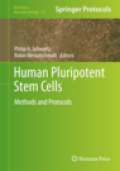
Human pluripotent stem cells: methods and protocols
Schwartz, Philip H.
Wesselschmidt, Robin
Almost daily, new technologies are being presented that move the field of human pluripotent stem cell research towards a future that may yield highly-effective, personalized medical treatments. Three enabling technologies at hand for human PSCs are 1) directed reprogramming of somatic cells, which eliminate many of the ethical issues associated with the derivation and use of human PSCs, increase genetic diversity of the available human PSC lines, and give rise to better in vitro human disease models; 2) the discovery that a Rho-associatedprotein Kinase (ROCK) inhibitor allows for efficient single cell passaging and cryopreservation, increasing the efficiency and reliability of hPSC culture;and 3) defined, animal-component-free media, which lay the groundwork for simplified scale-up for therapeutic applications, differentiation protocols, and toxicology screens. The aforementioned technologies can be found in Human Pluripotent Stem Cells: Methods and Protocols , a compilation of 33 detailed protocols in six categories of PSC research that cover laboratory essentials and the derivation of new PSC lines, including induced PSC lines, as well as their growth, maintenance, characterization, genetic manipulation, and differentiation. Written in the successful Methods in Molecular Biology™ series format, chapters include introductions to their respective topics, lists of the necessary materials and reagents, step-by-step, readily reproducible protocols, and notes on troubleshooting and avoiding known pitfalls. Authoritative and accessible, Human Pluripotent Stem Cells: Methods and Protocols serves as anideal guide to scientists conducting their own pluripotent cell research programs and makes great strides towards furthering human knowledge and, ultimately, improving the human condition. Includes cutting-edge methods and protocols. Provides step-by-step detail essential for reproducible results. Contains key notes and implementation advice from the experts. INDICE: The Stem Cell Laboratory: Design, Equipment, and Oversight. Stem Cell Banks: Preserving Cell Lines, Maintaining Genetic Integrity, and AdvancingResearch. Embryonic Stem Cell Derivation from Human Embryos. Derivation of Human Parthenogenetic Stem Cell Lines. Generation of Induced Pluripotent Stem Cell Lines from Human Fibroblasts via Retroviral Gene Transfer. Derivation of Induced Pluripotent Stem Cells by Lentiviral Transduction. Transgene-free Production of Pluripotent Stem Cells using PiggyBac Transposons. Traditional Human Embryonic Stem Cell Culture. Xeno-Free Culture of Human Pluripotent Stem Cells.Adaptation of Human Pluripotent Stem Cells to Feeder-Free Conditions in Chemically-Defined Medium with Enzymatic Single-Cell Passaging. GMP Scale-Up and Banking of Pluripotent Stem Cells for Cellular Therapy Applications. Culture of Human Pluripotent Stem Cells on Glass Slides for High-Resolution Imaging. Classical Cytogenetics: Karyotyping Techniques. FISH Analysis of Human PluripotentStem Cells. Immunocytochemical Analysis of Human Pluripotent Stem Cells. FlowCytometric Analysis of Human Pluripotent Stem Cells. The Teratoma Assay: An In vivo Assessment of Pluripotency. Detection of Copy Number Variation using SNP Genotyping. Genome-wide Epigenetic Analysis of Human Pluripotent Stem Cells by ChIP and ChIP-Seq. Basic Approaches to Gene Expression Analysis of Stem Cells by Microarrays. Development of High Content Screening Approaches and Analysis for Human Pluripotent Stem Cells. Quantitative Proteome and PhosphoproteomeAnalysis of Human Pluripotent Stem Cells. Lentivirus-mediated Modification ofPluripotent Stem Cells. Nucleofection of Human Embryonic Stem Cells. Non-viral Gene Delivery in Neural Progenitors Derived from Human Pluripotent Stem Cells. Gene Targeting in Human Pluripotent Stem Cells. Episomal Transgene Expression in Pluripotent Stem Cells. The Generation of Embryoid Bodies from Feeder-based or Feeder-free Human Pluripotent Stem Cell Cultures. Derivation of Oligodendrocyte Progenitor Cells from Human Embryonic Stem Cells. Directed Differentiation of Dopamine Neurons From Human Pluripotent Stem Cells. Methods for the Derivation and Use of Cardiomyocytes from Human Pluripotent Stem Cells. In VivoEvaluation of Putative Hematopoietic Stem Cells Derived from Human Pluripotent Stem Cells. Differentiation of Dendritic Cells from Human Embryonic Stem Cells.
- ISBN: 978-1-61779-200-7
- Editorial: Humana Press
- Encuadernacion: Cartoné
- Páginas: 425
- Fecha Publicación: 29/08/2011
- Nº Volúmenes: 1
- Idioma: Inglés
